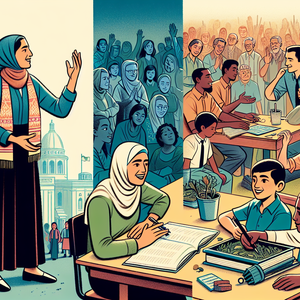Voices of Dissent: The Counter-Narratives to Radio Hate Speech

While the controversial radio figure amassed a significant following, many recognized the danger of his discourse. Journalists, activists, and ordinary citizens began to challenge his views, often at great personal risk. One of the earliest organizations to respond to the increasing tide of anti-Semitism propagated through media was the Anti-Defamation League (ADL), founded in 1913. The ADL mobilized efforts to counteract hate speech, utilizing their platform to expose the lies and misinformation being disseminated. Rabbi Stephen Wise emerged as a notable figure in this fight against hate. He delivered impassioned speeches and wrote extensively against anti-Semitic rhetoric, leveraging his own radio platform to present an alternative narrative that sought to educate the public about Jewish life and culture. His efforts exemplified how individuals could utilize media to combat hate, underscoring the importance of counter-narratives in the struggle against prejudice. Wise's approach not only informed listeners but also fostered empathy, inviting audiences to reconsider their preconceived notions.
Grassroots Movements and Community Action
Beyond individual efforts, grassroots movements arose to actively challenge the normalization of hate. Community organizations began organizing rallies, petitions, and educational campaigns aimed at raising awareness about the dangers of anti-Semitism and other forms of discrimination. The American Jewish Congress and similar organizations played a pivotal role in mobilizing public sentiment against hate speech, advocating for tolerance and understanding. A key strategy employed by these groups was the dissemination of factual information. They produced pamphlets, held public discussions, and engaged in debates that highlighted the fallacies inherent in hateful rhetoric. By providing a platform for education and dialogue, these dissenting voices helped to foster a more informed public capable of critically assessing the media they consumed. For instance, through community forums, they engaged in direct conversations with those influenced by the controversial radio figure, challenging misconceptions and presenting factual counterarguments.
Media's Role in Amplifying Dissent
As the battle against hate speech unfolded, the media itself began to play a crucial role in amplifying voices of dissent. Journalists who opposed dominant narratives took it upon themselves to report on the dangers of hate speech, often facing backlash from supporters of the controversial radio personality. Investigative articles that exposed the consequences of anti-Semitic rhetoric contributed to a growing awareness of the social responsibilities associated with media influence. Prominent publications such as The New York Times and The Nation provided platforms for dissenting voices, publishing editorials and opinion pieces that challenged harmful ideologies. These articles not only informed the public but also validated the efforts of activists working tirelessly to combat hate, creating a network of solidarity among those opposing bigotry. For example, coverage of community actions and the voices of dissenters helped frame the narrative around hate speech, emphasizing the need for collective action and resistance.
The legacy of hate speech in media is complex and fraught with challenges, but it is also marked by resilience and courage. The voices of dissent that rose in response to the anti-Semitic rhetoric propagated by a controversial radio personality remind us of the importance of standing up against harmful ideologies. These individuals and organizations not only challenged the status quo but also laid the groundwork for future activism in the fight against hate. As today’s media landscape continues to grapple with the repercussions of hate speech, the lessons from history remain relevant. The bravery of those who spoke out against hate serves as a powerful reminder of the need for vigilance and resistance in the face of prejudice. By amplifying diverse voices and fostering a culture of dialogue and education, we can hope to create a society that values empathy over enmity and unity over division. In doing so, we honor the legacy of those who dared to dissent, ensuring that their messages of hope and resilience continue to resonate in the fight against hate.
Media Analyst Specializing in Hate Speech
Nonprofit organizations, media watchdog groups, academic institutions
Job Description
Conduct in-depth analysis of media content to identify and report on instances of hate speech and misinformation.
Collaborate with journalists and advocacy groups to raise public awareness about the impact of harmful rhetoric.
Skills Required
Strong analytical skills
Familiarity with media law and ethics
Background in communications or social sciences
Community Outreach Coordinator for Anti-Discrimination Initiatives
Nonprofits focused on civil rights, community organizations, educational institutions
Job Description
Develop and implement educational programs aimed at raising awareness about hate speech and promoting tolerance within communities.
Organize community events, workshops, and discussions to foster dialogue and understanding among diverse groups.
Skills Required
Excellent communication and interpersonal skills
Project management experience
Passion for social justice
Journalist with a Focus on Social Justice Reporting
News organizations, independent media outlets, online platforms dedicated to social justice
Job Description
Investigate and report on issues related to hate speech, discrimination, and the impact of media narratives on marginalized communities.
Write compelling articles, opinion pieces, and features that challenge harmful ideologies and promote counter-narratives.
Skills Required
Strong writing and research abilities
Background in journalism or communication
Commitment to ethical reporting
Digital Content Strategist for Advocacy Organizations
Advocacy groups, nonprofit organizations, digital marketing agencies focused on social issues
Job Description
Create and manage online content that educates the public about the dangers of hate speech and promotes positive narratives.
Analyze social media trends and audience engagement metrics to refine messaging and outreach strategies.
Skills Required
Proficiency in digital marketing
Content creation
Data analysis
Experience in social media management
Policy Advisor for Hate Speech Legislation
Government agencies, think tanks, civil rights organizations
Job Description
Research and analyze existing hate speech laws and propose policy recommendations to address gaps and improve protections against discrimination.
Work collaboratively with lawmakers and advocacy groups to draft legislation and advocate for meaningful reforms.
Skills Required
Strong understanding of legal frameworks
Excellent communication and negotiation skills
Experience in public policy


